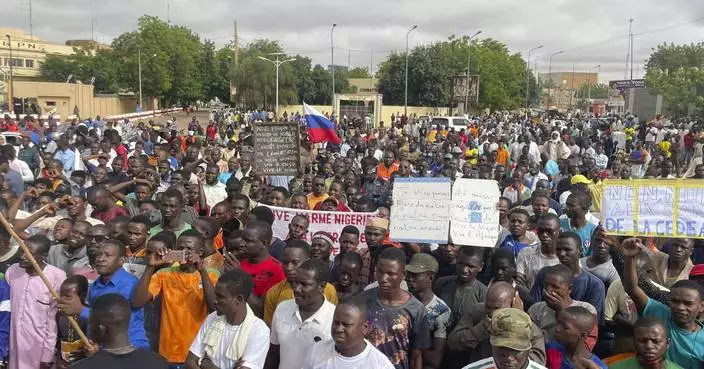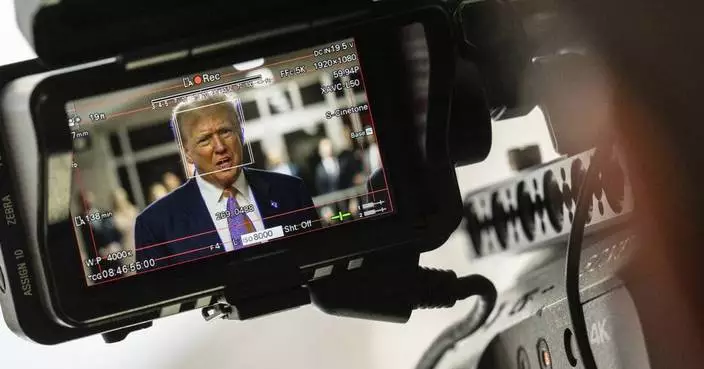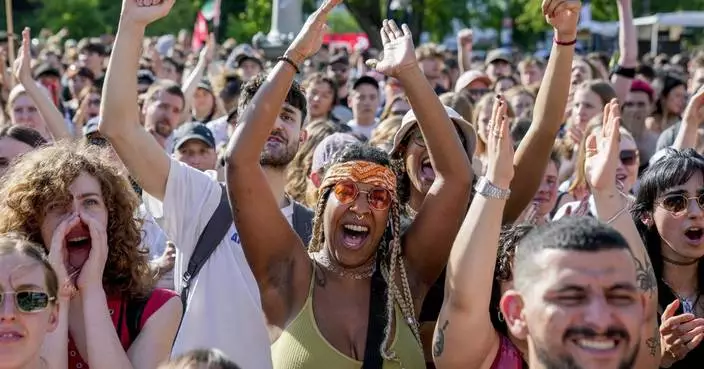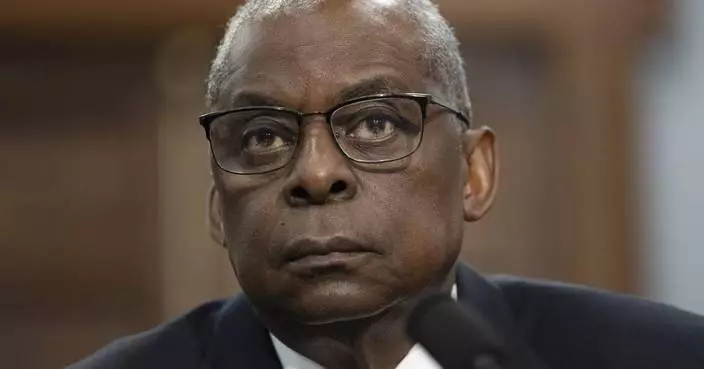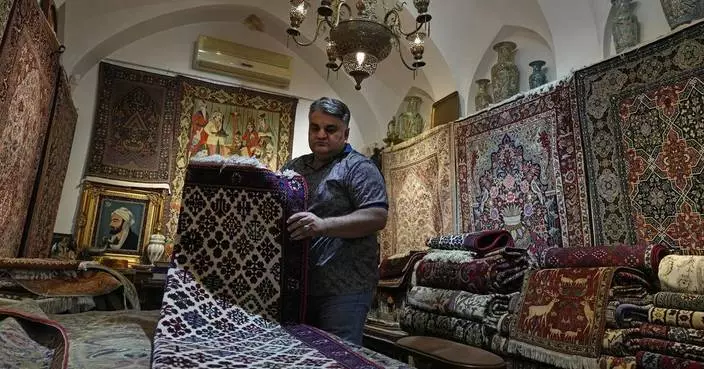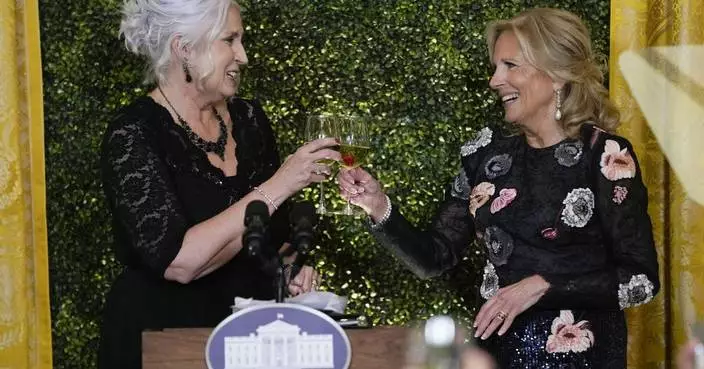All the bill needed to become law was President Donald Trump's signature. It would create a national archive of documents from civil rights cold cases. Students had been working on the project for years, families waiting on it for decades. But time was running out.
Legislation dies in the transition from one session of Congress to the next, and unless Trump acted, it would be lost.
So the students at New Jersey's Hightstown High School did what teenagers do: They started tweeting at the president.
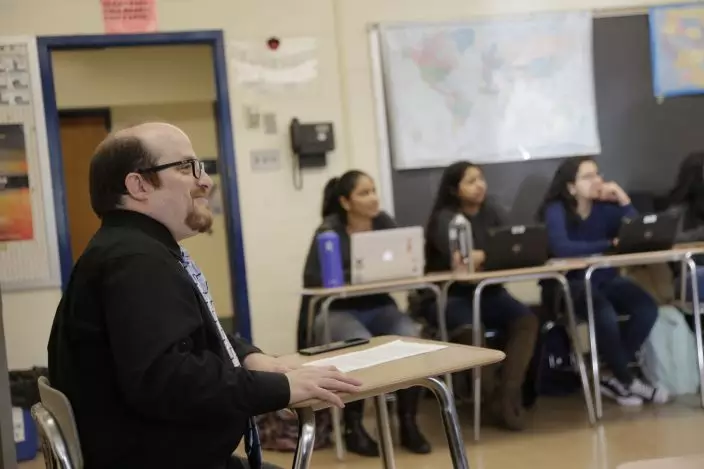
Stuart Wexler, left, leads his Advanced Placement government class in a discussion at Hightstown High School in Hightstown, N.J., Tuesday, Feb. 19, 2019. The high school students set their sights on an ambitious goal _ federal legislation to create a national archive of documents involving decades of unsolved civil rights cases. Students at a New Jersey school had worked on it for years. Now, all they needed was President Donald Trump’s signature. But if he didn’t act in time, the bill would die. The students took to social media and enlisted the aid of a new senator from Alabama. It worked: Trump signed and it’s now law.(AP PhotoSeth Wenig)
And not just Trump. They tweeted at his advisers, his staff and even Trump-friendly celebrities whose thousands of followers could carry their message to the White House.
As the deadline neared, Oslene Johnson, 19, was managing the project's Twitter account from under the blankets in her bedroom and trying not to be discouraged.
"When you really look at it, it's about providing closure for communities, families, and also as a country," said Johnson, who has since graduated but still works with the students.
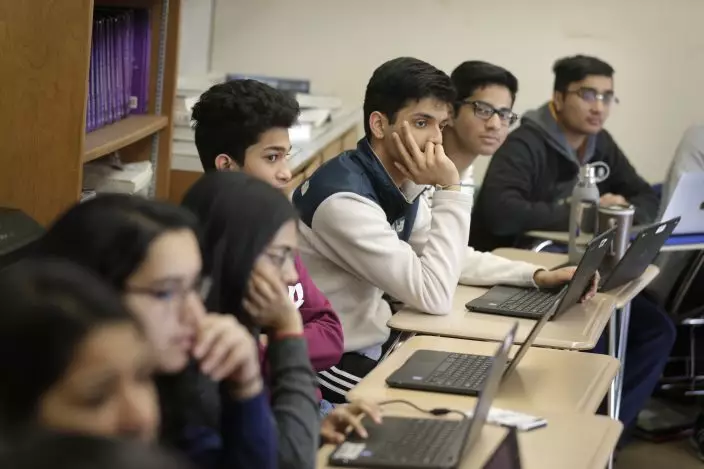
Students participate in an Advanced Placement government class at Hightstown High School in Hightstown, N.J., Tuesday, Feb. 19, 2019. The high school students set their sights on an ambitious goal _ federal legislation to create a national archive of documents involving decades of unsolved civil rights cases. Students at a New Jersey school had worked on it for years. Now, all they needed was President Donald Trump’s signature. But if he didn’t act in time, the bill would die. The students took to social media and enlisted the aid of a new senator from Alabama. It worked: Trump signed and it’s now law. (AP PhotoSeth Wenig)
Imagine, the class considered, all the people, African-Americans mostly, who have lived with questions about what happened to their loved ones 50 years or more ago. The killings and injuries have long passed. The perpetrators are gone. But the families, she said, "they're still with us."
The students' interest began in 2015, when teacher Stuart Wexler's Advanced Placement government and policy class at Hightstown High was studying the civil rights movement. They couldn't believe that in America, so many criminal cases involving racial violence and death could remain unsolved.
Srihari Suvramanian, 17, a senior, said in an Associated Press telephone interview with the class: "It's just atrocious that these individuals have gotten away with crimes committed decades ago, for so long, even though the majority of Americans know it's wrong."
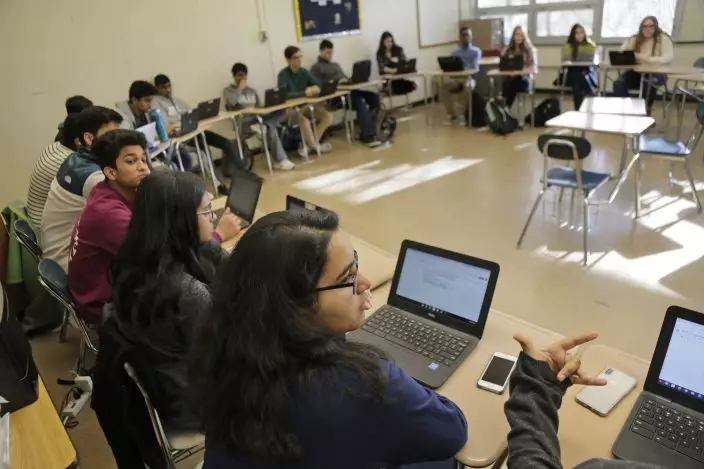
Students participate in an Advanced Placement government class at Hightstown High School in Hightstown, N.J., Tuesday, Feb. 19, 2019. The high school students set their sights on an ambitious goal _ federal legislation to create a national archive of documents involving decades of unsolved civil rights cases. Students at a New Jersey school had worked on it for years. Now, all they needed was President Donald Trump’s signature. But if he didn’t act in time, the bill would die. The students took to social media and enlisted the aid of a new senator from Alabama. It worked: Trump signed and it’s now law.(AP PhotoSeth Wenig)
He added: "We think it's very important to provide a sense of closure. Even if we can't get a full sense of closure, maybe provide some answers to the people that were denied justice."
The students crowdsourced a list of cases, filed Freedom of Information Act requests and then waited. Research on old cases often runs into dead ends, and they could imagine the difficulties that families go through trying to get answers.
They turned their attention to Congress.
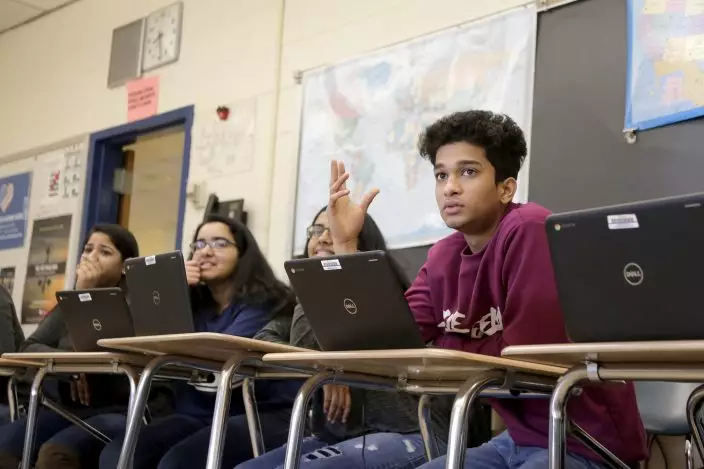
Students, including Aayush Gupta, right, participate in an Advanced Placement government class at Hightstown High School in Hightstown, N.J., Tuesday, Feb. 19, 2019. The high school students set their sights on an ambitious goal _ federal legislation to create a national archive of documents involving decades of unsolved civil rights cases. Students at a New Jersey school had worked on it for years. Now, all they needed was President Donald Trump’s signature. But if he didn’t act in time, the bill would die. The students took to social media and enlisted the aid of a new senator from Alabama. It worked: Trump signed and it’s now law. (AP PhotoSeth Wenig)
The President John F. Kennedy Assassination Records Collection Act of 1992, which collects records at the National Archives from the assassination, provided a model for the legislation they wanted. They took bus trips to Washington to find supporters. Rep. Bobby Rush, D-Ill., was among the first to sign on, inspired, his office said, by the work and the possibility it held.
Then Democrat Doug Jones won a Senate seat from Alabama in December 2017. They had already reached out to Jones, the U.S. attorney who won convictions after reopening the 16th Street Baptist Church bombing case from 1963 in Birmingham.
Six months after he was sworn in as the first Democratic senator from Alabama in a generation, Jones stood on the Senate floor and introduced the bill that would become the Civil Rights Cold Case Collection Act. The students watched from the gallery above.
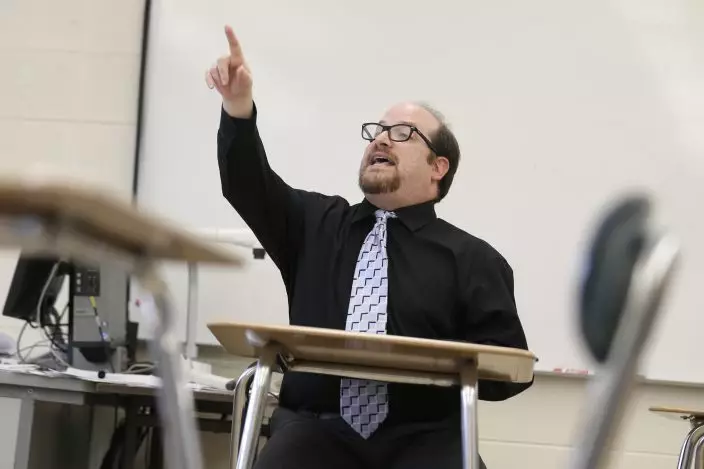
Stuart Wexler, left, leads his Advanced Placement government class in a discussion at Hightstown High School in Hightstown, N.J., Tuesday, Feb. 19, 2019. The high school students set their sights on an ambitious goal _ federal legislation to create a national archive of documents involving decades of unsolved civil rights cases. Students at a New Jersey school had worked on it for years. Now, all they needed was President Donald Trump’s signature. But if he didn’t act in time, the bill would die. The students took to social media and enlisted the aid of a new senator from Alabama. It worked: Trump signed and it’s now law.(AP PhotoSeth Wenig)
"Justice can take many forms," Jones said. Reconciliation can be a potent force, he said. "After all this time, we might not solve every one of these cold cases, but my hope is, our efforts today will, at the very least, help us find some long overdue healing and understanding of the truth."
Republican Sen. Ted Cruz of Texas, who was presiding in the chamber that day, has said he was so moved that he told Jones he would sign on as a co-sponsor. Cruz helped bring Republicans on board. By December, in the final days of the congressional session, the bill unanimously passed the Senate and was approved in the House, 376-6. From there, it was off to the president's desk.
But the students worried the bill would expire when the new Congress convened in January.
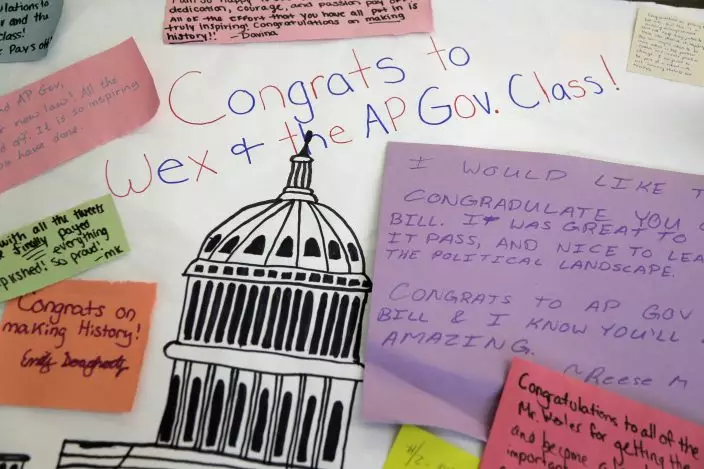
A poster congratulating Stuart Wexler's Advanced Placement government class is seen in a classroom at Hightstown High School in Hightstown, N.J., Tuesday, Feb. 19, 2019. The high school students set their sights on an ambitious goal _ federal legislation to create a national archive of documents involving decades of unsolved civil rights cases. Students at a New Jersey school had worked on it for years. Now, all they needed was President Donald Trump’s signature. But if he didn’t act in time, the bill would die. The students took to social media and enlisted the aid of a new senator from Alabama. It worked: Trump signed and it’s now law (AP PhotoSeth Wenig)
"We went on a mad, desperate scramble to get the president to sign the bill," said James Ward, a 17 year-old senior who helped mobilize the student body, class by class, "to take out their phones and tweet."
In Wexler's classroom, students posted photos of Trump's "midnight advisers" — aides, media celebrities — and started putting "X's" through the ones they had reached out to. "We were tweeting at as many people as we could," Suvramanian recalled.
He was finishing class one afternoon when he dashed off an email to Christopher Ruddy, the CEO of Newsmax and a Trump ally. "He got back to me within 30 minutes," the teenager said. After a short exchange, another note came back, "He said, 'I dropped a message to the president around 10 minutes ago and I really hope your bill gets signed into law.'"
Even with the new Congress starting the next day, the actual deadline for signing the bill was still a week away — the night of Trump's border security address to the nation amid what became the longest government shutdown in U.S. history.
Johnson, a student leader when the project started, tried not to lose hope as she tweeted. She had graduated and moved on, as had many other students. There have been dozens in all, over the past several years, who had been involved in the project.
Then word came. Jones' office told Wexler, who told the students: Trump had signed the bill, which focuses on unsolved criminal cases from 1940 until 1980.
Johnson cried.
"The families could now, with access to information, at least know something about what happened," she said.
Along with Trump's signature came a lengthy signing statement of potential concerns about the process for review and public release of the documents, but also support for Congress to fund the effort. Ruddy confirmed he had reached out to the White House, impressed by the students. He thinks the president would have been, too.
Margaret Burnham, a law professor at Northeastern University and director of the Civil Rights and Restorative Justice Project, said what Wexler and his class did was "nothing short of amazing."
"The creativity was not so much in framing potentially effective legislation, but in strategizing how to get it through the Congress," said Burnham, who has worked for years on these issues and similar efforts in Washington. "That's where Stuart and his students, over several classes, were just dogged — and creative, incredibly creative — in their ability to persuade Congress, people on both sides of the aisle, of the meaning and continuing urgency and significance of this issue."
Tahj Linton, 17, said he hopes other Americans understand the power they have to shape political outcomes. "If we can start to solve some of the racial problems that were never really closed in the past decades or 50 years or so, maybe we can start to work on the ones that are happening today and make a difference about it," he said.
Follow on Twitter at https://twitter.com/lisamascaro








